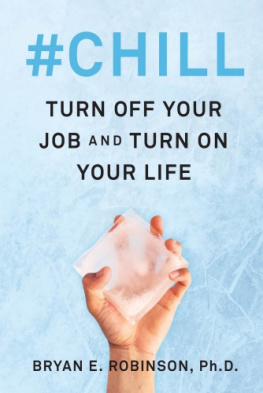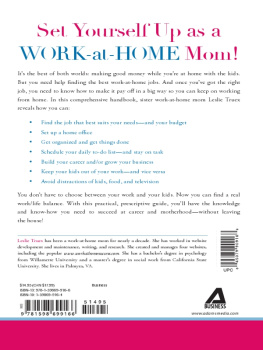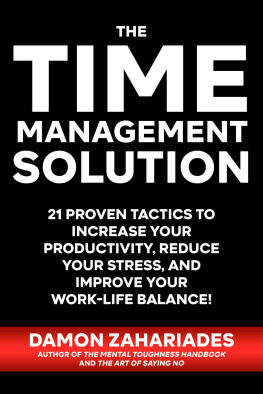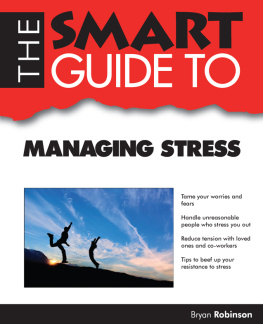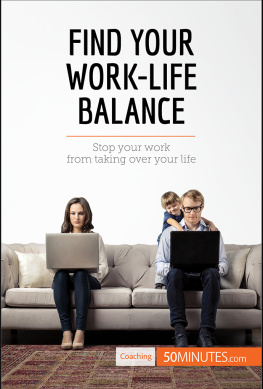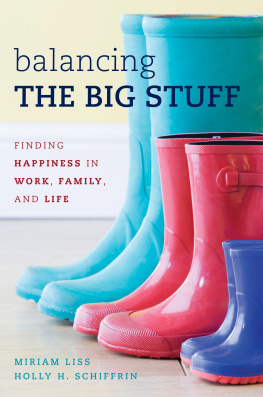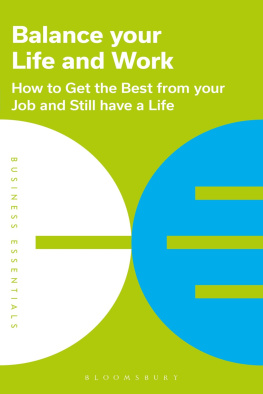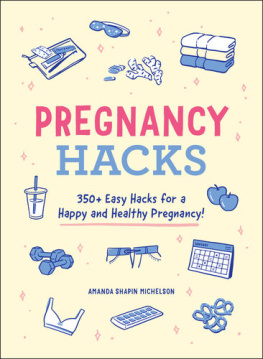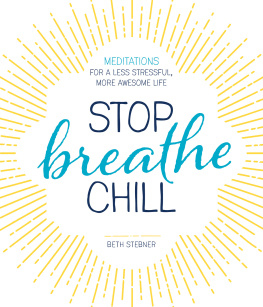For my spouse, Jamey McCullers, the love of my life and my favorite chill pill
Contents


In elementary school, the period I hated most was recess. When a teacher forgot to assign homework over Christmas vacation, I was the one who raised his hand to remind her. In high school, I wrote, directed, and produced the church Christmas play, designing and building the sets, and acting the lead role of Joseph. Doing everything gave me a sense of control missing within my chaotic family, where furniture-breaking fights between my mother and father were a regular occurrence.
In the throes of my adult work addiction, I needed my workand hid it from othersthe way my alcoholic father needed and hid his bourbon. And just as a child I tried to control my fathers drinking by pouring out his booze and refilling the bottle with vinegar, the people who loved me pleaded and tore their hair out trying to keep me from working all the time.
Every summer just before we left on vacation, my spouse, Jamey, would search my bags and confiscate any work I planned to smuggle into our rented beach house on the South Carolina shore. But however thorough the search, Jamey always missed the tightly folded papers covered with work notes that I had stuffed into the pockets of my jeans.
When Jamey and our close friends invited me to stroll on the beach, Id say I was tired and wanted to nap. While they were off swimming and playing in the surf, I secretly worked in the empty house, bent over a lap desk fashioned from a board. At the sound of returning footsteps, I stuffed my papers back into my jeans, hid the board, and stretched out on the bed, pretending to sleep.
Its only in hindsight that I can see I was a workaholic. Work was my sanctuarymy source of stability, self-worth, and protection against the uncertainties of life. I worked hard, yes, but I used work to defend myself against unwelcome emotional statesto modulate anxiety, sadness, and frustration. Jamey complained that I was never homeand that when I was, I didnt listenbut my university colleagues called me responsible and conscientious. I even toiled through most of the day of my fathers funeral. While my mother and sisters broke bread with old neighbors, I was in my university office twenty-five miles away, working on a project so insignificant I no longer remember what it was. Jamey called me controlling, inflexible, and incapable of living in the momentbut the promotions, accolades, and fat paychecks built an ever-stronger case against his accusations. I used them to vilify him: Why couldnt he pull his own weight? Why couldnt he be more supportive? Why was he constantly bothering me with problems that distracted me from building my career?
My life was crumbling under my feet, and I couldnt do anything about it. Or so I thought. I didnt smile. I couldnt eat. I didnt care if I lived or died. Even with my first book published, with other great projects in the worksI was a chain-smoking, caffeine-drinking work junkie, dogged by self-doubt. I had no close friends. My memory got so bad, members of my family wondered if I was developing early-onset Alzheimers. I snapped at colleagues, and they snapped back. I couldnt stop working.
When I entered counseling to help Jamey with his problem, the therapist confronted me about my work addiction and work/life imbalance. I joined Workaholics Anonymous, entered therapy, and stumbled into yoga and meditation. But what ultimately brought me through the ordeal was the practice of mindfulness meditation present-moment attention to my feelings and a compassionate, nonjudgmental connection with myself. The practice helped me begin my climb out of the work stupor into a saner life. And Jamey and I started to understand the crack in the foundation of our relationship.
I started to see my life through fresh eyes, watching Jamey care for his orchids and realizing the wisdom contained in the pleasure I got from simply working in the yard. As I started to chill, much to my surprise, I discovered how much I relished the smell of cut grass, the sight of a hummingbird pollinating a flower, the feel of warm earth between my fingers, and chats with neighbors.
Now instead of spending Saturdays in my basement office, I look forward to weekends of yard work, garage sales, and afternoon matinees with Jamey. When we go on vacation, I dont pretend to nap anymore. I fish by the dock, walk along the shore, and swim in the surf. Learning to be mindful of the present moment has enabled me to enjoy and savor my life as much as I had once savored my endless work.

I didnt need to use drugs because my bloodstream was manufacturing my own crystal meth.
WORKAHOLICS ANONYMOUS MEMBER
There are so many benefits to living a more chilled life. What better time to reevaluate and reset than Januarythe start of a new year with limitless possibilities? January is named for Janus , the Roman god of gates and doorways. There are many doorways and starting gates. And each of us begins from a different one, which raises the question: Is it possible for you to be nowhere else except exactly where you are? Or do you compare yourself to others and whisper inside that you should be further along in constructing a more chilled life? The important thing is for you to start the year from your own doorway. Nonstop working gets you lost in worry, stress, and anticipation, preventing you from seeing all of lifes possibilities. Are you ready to admit that constant working has made your life a hot mess, that you are powerless over a whole host of factors and conditions? Are you ready to begin exploring from where you are to bring your life into greater balance with more time to chill? Are you willing to drop your judgments, expectations, and preconceived ideas and approach your life with fresh eyes?
In Buddhism, this is called Right Mindfulness, waking up from a life on automatic and becoming fully aware of the present moment. What better time to start Right Mindfulness than with the beginners mindan expansive way of being in the world that opens you up to endless opportunities for your growth?
Two back-to-back heads symbolize the Roman god Janus, signifying that he is looking backward and forward at the same time. In this chapter, you have a chance to look back on your life and see that overworking has made it unmanageable. Looking forward, you contemplate ways to begin anew and build your life foundation around what matters most to you and make it more manageable. You become aware of what you have neglected and what needs attention for greater balance in the New Year: perhaps a faltering relationship, a healthier lifestyle, better work habits, a slower pace, or a generally more positive outlook.
CONSTRUCT YOUR SCAFFOLDING
Your workaholic habits are like an old building that needs renovating to withstand future wear and tear. As you conduct the repair work, you need temporary scaffoldinga wood plank to stand on and metal poles to lean onuntil your foundation is steady.
Start by finding a quiet place to sit for five minutes. With eyes closed, silently ask yourself if you have sufficient structures in place to create fresh starts: A self-care plan? Workaholics Anonymous meetings? A counselor? Daily meditations?
If you havent considered new scaffolding, contemplate what kind of support might bring you more balance in the New Year. The strategies you start withmuch like physical scaffoldingare incrementally removed as you develop stamina to sustain healthy work/life balance on your own.
Next page
